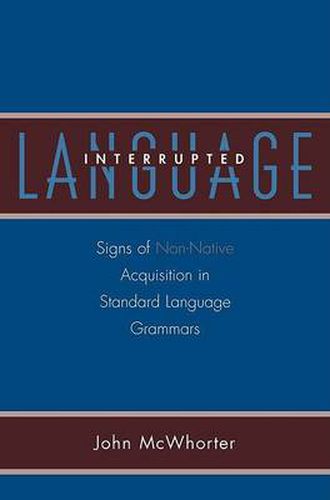Language Interrupted: Signs of Non-Native Acquisition in Standard Language Grammars
John McWhorter (Professor of Linguistics, Professor of Linguistics, University of California, Berkeley)

Language Interrupted: Signs of Non-Native Acquisition in Standard Language Grammars
John McWhorter (Professor of Linguistics, Professor of Linguistics, University of California, Berkeley)
Foreigners often say that English language is easy. A language like Spanish is challenging in its variety of verb endings (the verb speak is conjugated hablo, hablas, hablamos), and gender for nouns, whereas English is more straight forward (I speak, you speak, we speak). But linguists generally swat down claims that certain languages are easier than others, since it is assumed all languages are complex to the same degree. For example, they will point to English’s use of the word do – Do you know French? This usage is counter-intuitive and difficult for non-native speakers. Linguist John McWhorter agrees that all languages are complex, but questions whether or not they are all equally complex. The topic of complexity has become a hot issue in recent years, particularly in creole studies, historical linguistics, and language contact. As McWhorter describes, when languages came into contact over the years (when French speakers ruled the English for a few centuries, or the vikings invaded England), a large number of speakers are forced to learn a new language quickly, and this came up with a simplified version, a pidgin. When this ultimately turns into a real language, a creole, the result is still simpler and less complex than a non-interrupted language that has been around for a long time. McWhorter makes the case that this kind of simplification happens in degrees, and criticizes linguists who are reluctant to say that, for example, English is simply simpler than Spanish for socio-historical reasons. He analyzes how various languages that seem simple but are not creoles, actually are simpler than they would be if they had not been broken down by large numbers of adult learners. In addition to English, he looks at Mandarin Chinese, Persian, Malay, and some Arabic varieties. His work will interest not just experts in creole studies and historical linguistics, but the wider community interested in language complexity.
This item is not currently in-stock. It can be ordered online and is expected to ship in approx 2 weeks
Our stock data is updated periodically, and availability may change throughout the day for in-demand items. Please call the relevant shop for the most current stock information. Prices are subject to change without notice.
Sign in or become a Readings Member to add this title to a wishlist.

